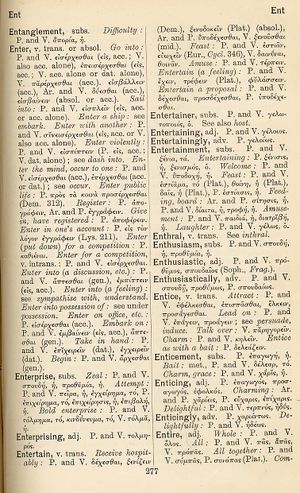entice: Difference between revisions
From LSJ
Ubi idem et maximus et honestissimus amor est, aliquando praestat morte jungi, quam vita distrahi → Where indeed the greatest and most honourable love exists, it is much better to be joined by death, than separated by life.
(Woodhouse 3) |
(CSV4) |
||
| Line 1: | Line 1: | ||
{{ | {{Woodhouse1 | ||
| | |Text=[[File:woodhouse_277.jpg|thumb|link={{filepath:woodhouse_277.jpg}}]]'''v. trans.''' | ||
<b class="b2">Attract</b>: P. and V. ἐφέλκεσθαι, ἐπισπᾶσθαι, ἕλκειν, προσάγεσθαι. | |||
<b class="b2">Lead on</b>: P. and V. ἐπάγειν, προάγειν; see [[persuade]], [[induce]]. | |||
<b class="b2">Talk over</b>: V. παρηγορεῖν. | |||
<b class="b2">Charm</b>: P. and V. κηλεῖν. | |||
<b class="b2">Entice as with a bait</b>: P. δελεάζειν. | |||
}} | }} | ||

